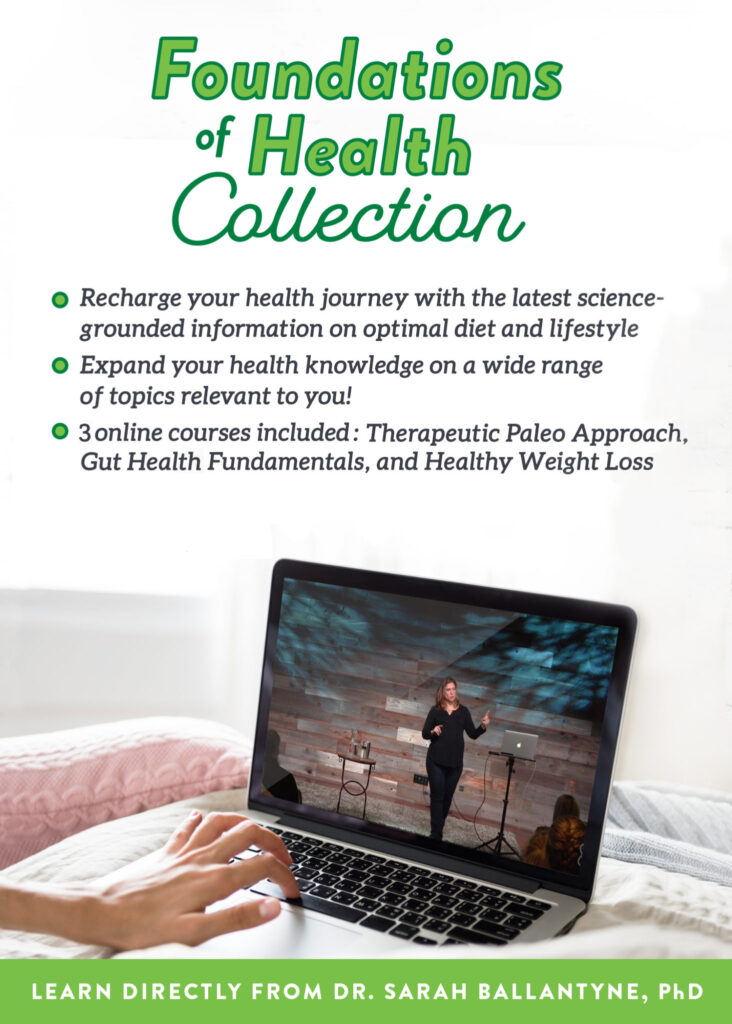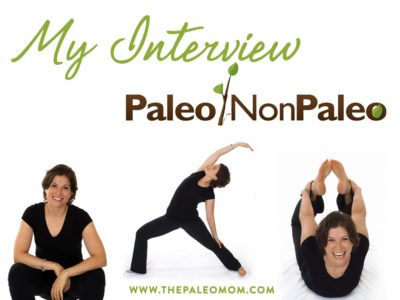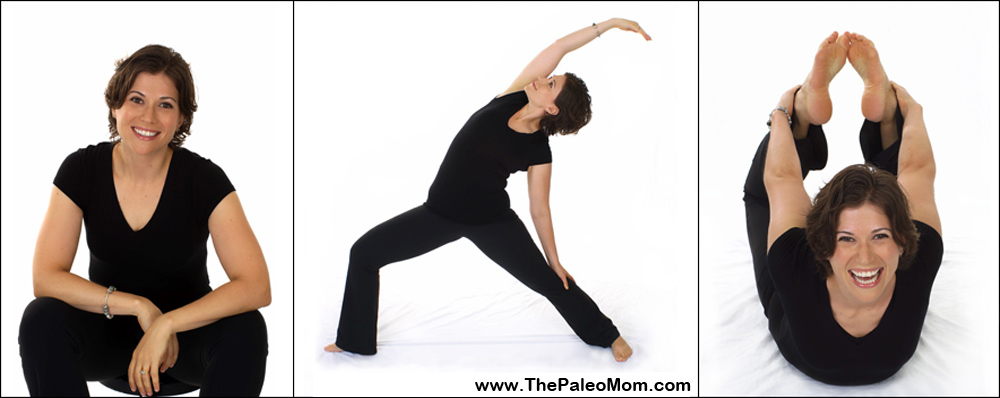I was recently interviewed by Alison Golden of www.PaleoNonPaleo.com. I thought the questions were really fun to answer and thought this might be a fun way for you to get to know me but also learn more about the autoimmune protocol. Below is the interview as it appeared on PaleoNonPaleo. I also encourage you to check out Alison’s blog as it’s a great resource for anyone struggling with the Paleo diet in non-Paleo families, workplaces, etc.
The Paleo Mom: Is the Paleo Autoimmune Protocol Too Hard? You Decide.
The Paleo Autoimmune Protocol page is one of the most popular pages on this site and questions about it regularly arrive in my inbox. That tells me that a lot of people have autoimmune disease and are looking to deal with it using the Paleo diet.
An expert in this area is Sarah Ballantyne, aka The Paleo Mom. Sarah has a Ph.D. in Medical Biophysics and she’s lost over 100lbs – twice! She lost weight by low-carbing but it has been since she started eating a Paleo diet, and particularly by following the autoimmune version of Paleo, that she experienced major health benefits and a further loss in weight. The autoimmune disease she suffers from is lichen planus – similar to psoriasis.
No Ph.D.? No problem.
Save 80% Off the Foundations of Health
Expand your health knowledge on a wide range of topics relevant to you, from how to evaluate scientific studies, to therapeutic diet and lifestyle, to leaky gut and gut microbiome health, to sustainable weight loss, and much more!!!

I first encountered Sarah when she guest posted on Paleo Parents. Sarah wrote a great series on leaky gut which is often a precursor to autoimmune disease. She has a wonderful way of explaining it without it feeling like you’re the one who needs the Ph.D., a common problem I’ve found with many leaky gut explanations.
- What Is A Leaky Gut? (And How Can It Cause So Many Health Issues?)
- How Do Grains, Legumes and Dairy Cause a Leaky Gut? Part 1: Lectins
- How Do Grains, Legumes and Dairy Cause a Leaky Gut? Part 2: Saponins and Protease Inhibitors
- What Should You Eat To Heal a Leaky Gut?
She also has scads and scads of information about Paleo and autoimmune disease, and regularly posts Paleo recipes many of which adhere to the autoimmune protocol. So if you’re suffering from autoimmune disease, her site really is a one-stop shop for you!
My own experience with the AIP is that it can be very hard to stick to so I sat down for virtual coffee with Sarah, and asked her a few questions about her experience with Paleo and the autoimmune protocol.
There is a huge amount of interest in the autoimmune protocol judging by the interest on my site, what do you eat and why?
The autoimmune protocol is a very powerful strategy for managing autoimmune disease and many are finding that their need for medications is diminished if not gone completely. There are also very few resources for people with autoimmune disease interested in the Paleo autoimmune protocol, but there are several bloggers out there working to change that.
I am following nearly the strictest version of the autoimmune protocol. I do eat most seed-based spices as long as they aren’t nightshades (I’m careful with cumin and pepper because I think I might be having reactions to them). I can handle a small handful of nuts in a salad as long as I stay away from almonds; but if I eat too many nuts, I quickly see signs of inflammation. I eat tons of healing foods, lots of organ meat, broth, soups, coconut milk yogurt, coconut oil, grass-fed meat, wild-caught fish, homemade sauerkraut. I do eat raw and cooked veggies (staying away from most starchy vegetables, although I can handle a small portion) and I eat a fair amount of fruit (which I tolerate well). Doing this has allowed me to manage my autoimmune disease without the use of steroids, and that’s pretty darned awesome.
Do you have any trigger foods you have to stay away from?
Nightshades are huge triggers for me. I will not put something that touched a tomato into my mouth. I also have to be careful of eggs, almonds, chocolate, all dairy, and too much starch or insoluble fiber. And of course, I would not touch a grain or legume with a 10-foot pole.
I read earlier this year that you continue to tweak your eating and exercise habits to remove the final lingering issues, (I can relate) how are you doing with those?
I feel like a constant work in progress. But, I am making actual progress, even if it’s slower than I’d like. For me, it’s more about healing my body and managing my autoimmune disease than it is about losing more weight or even making milestones at the gym (although I wouldn’t complain if I could find a way to lose 15 more pounds or get strong enough to do some more challenging arm balances in yoga). I had a flare last summer which has been challenging to figure out. Actually, that’s not entirely true. It was completely easy to figure out once I got over my denial about being sensitive to chocolate, coffee, eggs, all nightshades, and almonds. The flare started after I had been following the AIP for about 6 months and I had been trying to reintroduce foods that I had eliminated. I was doing this at a time when my stress level was quite high too, which on hindsight was not the greatest idea. I just really wanted to be able to keep enjoying those foods., and it was hard to accept that (at least for now) I can’t. But, my healing is back on track, which is what motivates me to continue.
The AIP is tough over the longer term, do you fudge it at all? What happens if you do – how reactive are your symptoms? Do you anticipate a time when you will be able to come off it?
Following the AIP is very tough, but I actually think it gets easier over time. I had a much more difficult time figuring out what to eat and figuring out fast meals and convenience foods when I first started. Now, I find it fairly easy to plan ahead and budget my time in the kitchen. I have a large repertoire of delicious AIP-friendly meals to make. And, I’ve discovered how much I enjoy some fairly unorthodox foods for breakfast (like borscht or fried lamb kidney with sauerkraut). Getting used to eating foods I normally wouldn’t have associated with breakfast has been one of the biggest parts to making the AIP feel easier. I also don’t feel like I’m missing out as often now, which I think is because I am getting a lot of enjoyment out of the foods I’m eating these days.
Yes, I do fudge a little, but not as much as I used to. I have spent nearly a year on the Autoimmune Protocol, but much of that time was spent trying to figure out where my line is. And unfortunately, it seems as though I have to stay pretty strict in order to continue to see improvements in my skin. But, I am human. I do occasionally eat things that I know aren’t good for me. For example, I do take a bite of any new recipe I’m working on for the blog that isn’t AIP-friendly. If I know I’m very likely to react, I actually chew it and spit it out; but on the other end of the spectrum, if I know I probably won’t react that badly, one bite might turn into seven or twenty. I have been experimenting with ways to satisfy my sweet tooth within the confines of the AIP (even though sugar is inflammatory and I know I really should just stick with meat and veggies). However, I’m actually doing a much better job keeping my “cheats” to a minimum these days (and restricting myself to foods that I know won’t cause much of a reaction). The more I heal, the fewer food cravings I seem to have, so that makes it easier too.
I do think that I will need to stay on the AIP (or at least the way I’m implementing it now, which allows for seed-based spices and occasional nuts and seeds) for a long time—I’m thinking years. I have two young kids, so my sleep is not optimal. I am up with one or both of them most nights (going on 6 years now) and this is one of my biggest challenges to healing. I think that until I am reliably getting good quality (and quantity) sleep, my diet will have to stay very clean.
Who would most benefit from the autoimmune protocol and what can they expect in terms of degree of difficulty, withdrawal or cravings, health benefits?
I could write an entire book on this topic. I think anyone with diagnosed autoimmune disease, a strong family history of autoimmune disease, or symptoms of early autoimmunity that aren’t going away with a standard Paleo diet are good candidates for the autoimmune protocol. How long it takes to see improvement and how dramatic that improvement is varies from person to person. It’s dependent on what autoimmune disease a person has, how advanced it is, what other issues are going on in their bodies (like yeast or bacterial overgrowths, food sensitivities, micronutrient deficiencies, how well the liver is functioning, etc.) and how well they comply with the AIP and address other lifestyle factors (like sleep, stress management, and spending time outside).
In terms of how difficult it is to implement, that really depends on what diet a person is coming from and how comfortable they are in the kitchen. From a standard Paleo diet perspective, the biggest challenge is figuring out breakfasts. My breakfasts typically consist of any combination of homemade sausages, pastured bacon, soups, leftovers, veggies, sauerkraut, and fruit. My emergency I-have-no-time-to-make-anything breakfast is a big bowl of broth (which I always keep in my freezer), a spoonful of extra virgin coconut oil, and a banana.
The transition is tougher from a Standard American Diet and I usually recommend that people transition to a standard Paleo diet (or something similar like the GAPS diet or SCD diet) first. Many people will see some improvements and won’t actually need to tackle the full AIP. The AIP also requires a commitment to food preparation and cooking beyond what most people need to do on a standard Paleo diet. This can be the most overwhelming part for people: how to find enough time in the kitchen to cook AIP-friendly food. This gets easier over time. My biggest trick is to use my freezer. I make big batches of everything and then freeze portions for quick meals when needed. And leftovers are my best friend.
You lost 100 pounds (twice!) before you went Paleo and then a further 20+lbs after you’d changed to a Paleo diet, what do you consider were the most critical factors in your success. And also in keeping it off? What had to change in your life for that success to happen?
The biggest factor in my weight loss success is stress management and sleep. Yep, not diet at all. Getting enough sleep and managing my stress levels through yoga, walking and just plain old having fun are what have made making the right food choices easy. Even now, if I have a particularly bad night (with two young kids that happens more often than I would like), I find it very difficult to control my food intake the next day and have very strong sugar and/or fat cravings. Prioritizing sleep and stress management has also been critical in weight maintenance and in healing in general.
How do you feel now about the unhealthy, sick years you had?
Conflicted. I feel mournful and frustrated that twenty years ago I didn’t have the nutrition knowledge I have now. I feel angry knowing that I could have prevented autoimmune disease if I had followed a Paleo diet back then and taken more steps to manage stress. I wonder how being healthier in my pregnancies might have positively influenced my daughters’ health. I wonder what permanent damage has been done to my body that I will never be able to heal. I still wish that I could have been thin and elegant in my wedding dress. But, I am happy to have found a solution when I did, and I try to focus on that positive as much as possible. I am so much healthier now, and I truly appreciate that.
I really try never to regret anything from my past (that can be tough sometimes, but it’s a worthy goal). My past experiences are what made me who I am today. And I like who I am and where I am in life. I doubt that I would be blogging about lifestyle and nutrition if I hadn’t had those experiences. So, how can I regret something that now allows me to help, educate and inspire so many?
What changes have you noticed in your family since you have changed their diet? Did they come to Paleo willingly or reluctantly? How did you manage the transition?
I followed a Paleo diet on my own in the household for several months before trying to transition my family. They transitioned slowly, first to gluten-free, then to grain-free, then to primal/lacto-Paleo, then to full Paleo (legumes were easy to get rid of in our household). It took about six months. They relied very heavily on Paleo baking in the beginning, but we have phased out most of it over time (my oldest daughter still eats Paleo bread most days with her breakfast, which is my next target). We have seen health improvements in the whole family. My oldest daughter has more energy, better behavior, and sleeps better. My youngest daughter had obstructive sleep apnea caused by a malformation in her larynx and aggravated by acid reflux and inflammation. She went from having apnea events several times most nights to now only having it once every few weeks (more frequent during viral infections). My husband didn’t really have any health problems, so it’s hard to pinpoint specific improvements in him. His digestion is better, which is probably the biggest difference for him.
What about your husband? Did he jump onboard? How did he react and how did you get his support/manage with his reaction?
In the beginning, my husband made a statement about how he was not giving up his bread and cereal. Of course, I do all the shopping and the cooking and quickly found some great ways to make Paleofied versions of his staples, which helped tremendously. Plus, I’m a very good cook and he soon realized that eating Paleo was still going to taste good. He doesn’t even remember saying that now and swears that he was on board from the beginning.
Apart from yoga, what exercise do you do? Did you manage to reset your set point with sprinting?
Ugh. Sprinting. No, that didn’t end up working for me. I lost my enthusiasm for it and found myself dreading my workouts. And my philosophy on activity is that you have to enjoy it. I love my yoga classes and look forward to them. I feel so great during and after. That is something sustainable for me. My schedule this fall changed and I can no longer get to all three of my regular classes each week, so I’ve been replacing that third yoga class with a “pure muscle” class instead (basic full body weight lifting workout). I don’t love it, but I do like that I can see myself getting stronger. I’d rather do more yoga though. I also walk at least a couple of times per week, either going for a family hike (typically fairly rigorous) or walking the mile uphill pushing my youngest in the stroller to pick my oldest up at school (and then the much slower walk back downhill returning home), which we try to do twice per week. I also play fairly actively with my kids and do some gardening. I would love to do more but can’t seem to find a way of integrating more activity with my schedule in a sustainable way.
What are your favorite Paleo recipes?
My favorite recipes that I actually make over and over again in my home are:
Pomegranate Molasses-Glazed Salmon
Greek-Inspired Slow-Roasted Leg of Lamb
Egg-Free, Tomato-Free (Hidden Liver) Paleo Meatloaf
Paleo Shrimp Chow Mein
Paleo Chicken Pad Thai
Honey-Garlic Chicken Wings
Offal (But Not Awful) Stew
Chicken Bone Broth (Revisited)
Honey-Candied Ginger
Pumpkin Spice Dehydrator Cookies (AIP-friendly)
How do you handle entertaining and eating away from home?
Typically, I host most of our get-togethers, which I love doing because then I’m in control of the food (and I like cooking). For any meal or party that I host, I will keep everything Paleo. I do typically make Paleo foods that are more broadly appealing (sweeter cookies than I normally make, for example, or roasts with lots of side veggies so no one misses dinner rolls and mashed potatoes — and I save the beef cheek, lamb’s liver, and pork trotters for other occasions). When we get invited to other people homes, I mention our food requirements to the host and always offer to bring something that we can eat to contribute to the meal/snacks etc. If it’s a potluck, I always bring something that will satisfy our family just in case there really isn’t anything else on the table that we can participate in. I also relax my food standards for my kids, who have gluten intolerances, but can handle small occasional doses of non gluten-containing grains, dairy, and legumes. I think part of getting through these events is figuring out where the line that you won’t cross is (for me it’s nightshades, grains and legumes; but for my husband and kids, it’s just gluten).
It also helps dramatically to be able to say “No,” at least sometimes. My kids don’t sleep in, so I use their young ages and early bedtimes as an excuse to skip out on many evening social events (which helps me get to bed at a good time throughout the holidays too!). Of course, we don’t say no to everything and sometimes a babysitter is required. Being a team with my husband helps because if we do go out in the evening, we’re usually both tired the next day (some parents take turns so the other can rest, but we typically team up and do everything together). It also helps that we both tend to prefer quiet, so the activities that we plan are low-key things like family hikes, trips to the playground, building a fire in the fireplace, and finding board games that two adults, a nearly 6-year old and a 3-year old can all play together.
What would you say to anyone considering the autoimmune protocol? What is the best advice you can give them?
Plan ahead. Spend a day or two cooking and see if you can fill your freezer with AIP-friendly foods (like broth, soups, stews, homemade sausage, precooked meats). Having foods easily available to you is one of the most important things you can do to set yourself up for success. Don’t forget the healing foods like broth, fish, grass-fed meat and coconut oil. And make sure to eat organ meat! Also, don’t forget the importance of sleep and stress management. The better you are able to optimize sleep and stress management, the faster you will heal and all this work that you are putting into your diet will pay off.
Don’t feel frustrated or discouraged if the autoimmune protocol isn’t an instant fix. Many people need some time to heal internally before they notice a dramatic difference in their symptoms. Try to stick to the strictest version of the AIP for 2-3 months before tweaking. I also recommend finding a Paleo-savvy functional medicine practitioner to work with if at all possible. Micronutrient deficiencies and food sensitivities can be confounding factors and these aren’t easy to identify on your own.
Remember that you are not alone. There is an entire community out there of people who found the Paleo diet through frustration with autoimmune disease (who are then frustrated that they have to give up eggs and coffee). If you need a little support, you are always welcome to drop by my Facebook wall and leave a message or ask a question.





 Orange-Cranberry Muffins
Orange-Cranberry Muffins